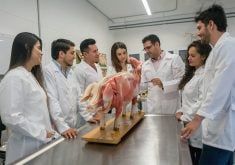ARELEE, Sask. – Dennis Pashovitz smiles at the look on his alpacas’ faces as they hum and chew sideways through some grass.
He said the 11 animals are “a big stress relief” on his family’s grain farm in west-central Saskatchewan.
His wife Karen added that before their two children were born, she and Dennis would spend summer evenings sitting on lawn chairs and looking at their little herd of fibre-producing animals.
Alpacas, which are a smaller cousin of llamas and camels, originated in South America. Many people like having them around because they are a low stress, low maintenance animal that makes admirers feel happy.
Read Also

Fuel rebate rule change will affect taxes and AgriStability
The federal government recently announced updates to the fuel rebates that farmers have been receiving since 2019-20.
The Pashovitzes started buying alpacas in 2000 as a farm diversification that would allow Karen to earn income while staying home with Tasjia, 3, and 19-month-old Jessy.
This July the herd will expand because they are expecting six baby alpacas.
While the initial stock cost can be high, especially because the couple wanted good quality fibre animals to make salable products, the alpacas are cheap to raise. Dennis said they feed hay cut from local ditches. Alfalfa would provide too much protein for the animals and cause their fibre to grow coarse.
“You can feed 10 alpacas from what one cow would take,” he said.
The alpacas are sheared every spring and the fibre sent to mills to be turned into a variety of products that Karen can sell at craft shows. Their business, called Prairie Fire Alpacas, sells processed and hand spun yarn, thick and thin socks, scarves, toques and mittens.
Karen said alpaca fibre is seven times warmer than sheep wool, does not cause allergies and wicks moisture away from skin. The Pashovitzes have one customer who finds the socks warm enough to wear in the winter with shoes instead of boots.
Karen said she loves the gentle animals and Dennis agreed that they are her big pets. They are not worried about having their young children around the alpacas while Karen waters and feeds them.
“We researched them for two years before we got them from a farm near Saskatoon,” Karen said.
Dennis used to farm with his father and two brothers but decided to strike out on his own four years ago. His family was leery of the alpaca venture but the couple said it has almost reached the point where it can replace the income of a regular job.
The other part of the farm is still a tricky venture for the 30-something farmers. Starting out on their own by buying four quarters during the past few years of uncertain growing seasons was bad timing, Dennis said.
“It was a big learning curve, like drinking water from a fire hose.”
But the couple likes being their own bosses. Dennis now farms 4,000 acres, usually with help only for seeding and harvest. Last fall Karen started combining for the first time and decided she liked the chore even though she was out until 3 a.m.
“I felt like I was contributing,” she said.
But Dennis figures he will need full-time hired help soon.
Of the mixed bag of crops they planted in 2005 – peas, lentils, beans, canola and oats – Dennis said he grows anything that can make money.
“We’re going to put more beans in next year and red lentils, but no wheat.”
Dennis checks crop production contracts with companies through phone calls and e-mails and listened to experts at last month’s Crop Production Show in Saskatoon.
He bought used equipment when he started because he is handy at fixing it, but a busy schedule is forcing him to upgrade and find a balance between the cost of machinery and the time for repairs.
He is deliberately growing more pulse crops because they create their own nitrogen and he is seeking out other farm input suppliers who offer deals to those who buy in volume.
He also bought a semi truck to do his own hauling but companies that buy contracted crops often send their own trucks to the farm.
The diversity of their farm is apparent in the eight hopper bottom grain bins that line the driveway and the two new bins behind the alpaca enclosure.
Karen and Dennis took a week last summer with friends and family to put up a 22,575 bushel bin but it was such a major undertaking that they hired a company to put up the second.
“There’s a lot of nuts and bolts in those babies,” Karen recalled.
In 10 years the Pashovitzes hope to still be farming but to be comfortable.
“We’d like to have a bit of a cushion there and not be tied down to the operation,” Dennis said.














